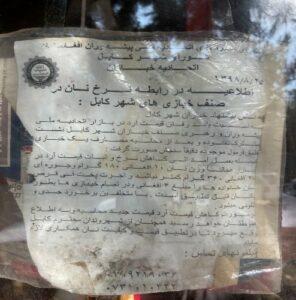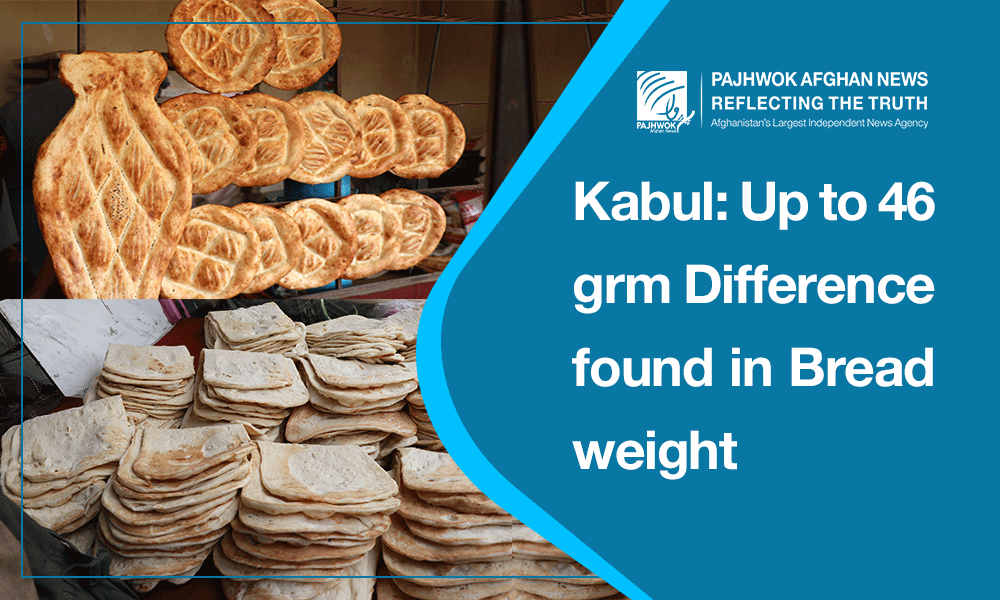KABUL (Pajhwok): Kabul bakeries are selling a piece of bread that weighs 125 to 171 grams for 10afs, angering consumers, Pajhwok Afghan News has learnt on good authority.
Members of the general public and economists slammed the weight difference as brazen injustice. But the Kabul market management director said bakery owners had reason for the difference in bread weight and that the problem was temporary.
reason for the difference in bread weight and that the problem was temporary.
In 2017, the Bakers Union had agreed that one piece of 10afs bread should weight 180 grams. A copy of this decision is still available in some bakeries.
The union’s decision is no longer being implemented because, according to bakery owners, the price of flour has increased.
In 2017 the price of 49 kilogram flour was 1,650 afs while currently the price of 49 kilogram flour stood at 2,300 afs.
Currently, 10 afs bread — weighting from 125 to 171 grams — is sold by different Kabul bakeries. Bakery owners selling 10 afs bread (160gr to 170gr) said they were still earning profits.
Pajhwok investigation
This Pajhwok reporter weighed freshly baked bread at 20 bakeries in different areas of Kabul from November 22 to December 6.
In Taimani, one piece of 10afs bread in a 4th street bakery weighed 171gr, in the 9th street 160gr and in Kalola Pushta 158gr, in the 8th street of Taimani 157gr, 5th street 152gr and in the 8th street of Qala Fathullah 151gr.
While visiting other localities, Pajhwok found 10 afs fresh bread in Paiko bakery weighting 150gr, in Saleem Karwan 147gr, Madina Bazar 147gr and in the 4th street of Qala Fathullah 146gr.
Of the 20 bakeries visited, freshly baked bread in Chahar Rahi Tarafik, Kalola Pushta and Qala Fathullah bakeries has the lowest weight.
One 10 afs bread in Chahar Rahi Tarafik weighed 125gr, in Kalola Pushta 135gr and in Qala Fathullah 136gr.
Syed Alam, selling bread in Chahar Rahi Tarafik locality, argued the only reason for the decreased bread weight was the rising flour price.
When asked why other bakeries sold bread with high weight at the same rate, he replied: “They don’t work all the time. When flour prices soar, they close down their bakeries.”
Referring to the price list approved by the union, he said the rates were very high and that the list could not be implemented at this stage.
Din Mohammad, owner of a bakery in Kalola Pushta area, insisted they baked bread weighting 170 grams, not 135 grams.
However, he acknowledged reducing bread weight by five grams due to soaring flour and gas prices in the capital city.
In Taimani bakeries, the weight of 10 afs bread ranged between 171 and 160 grams. Both were happy with their work and said they were still earning.
The owner of the Noorul Haq bakery in Taimani said: “By reducing the weight of bread, we managed to run our business.” Bread baked by this bakery still has the highest weight.
Abdul Hakim owns a bakery in the 9th street of Taimani. His bakery’s bread weighs 160 grams. He said he was gaining fewer profit by reducing the bread weight by 20 grams. But he is satisfied with less profit because he does not want to lose his clients.
Noorullah Omari, head of the National Chamber of Professionals, agreed most bakeries had reduced the weight of bread up to 140 grams. No information had been shared on the weight of bread after November.
He said: “In the open market, no pricing system exists. We are waiting for prices to fall so that we can change the rate and weight of bread in order to control the market in the future. We are waiting for the current government’s economic policy.”
Bread weight difference unfair
Hasib Omar, a resident of Afshar area, commented: “It is true that the price of flour has gone up. But some bakers have reduced the weight of bread so much and this is not fair.”
He proposed there should be a system to control prices in the market; otherwise everything would spin out of control.
Mursal Gauhari, who belongs to Khair Khana neighbourhood, said: “In the past, a piece of bread was enough for one person. But now it is not enough. This is expensive for families.”
Gauhari called for addressing the issue, saying: “What is the duty of the municipality? Why does not it control such things?”
Economist Sher Ali Tazari said: “The main problem in Afghanistan is that if the price of a product goes up by one percent, traders raise it by two percent. But when the price comes down, they do not lower it.”
In Afghanistan, he noted, there was little competition and the market was monopolised by a few people, who manipulated prices.
Tazari believed the government could always intervene in the market to ensure justice, because there was no “free market” in the country.
Officials who said they had no right to intervene were either taking advantage of this situation or running away from their duty, the economist alleged.
He opined the government could intervene in the market and there was no obstacle to prices control measures in the current situation.
Earlier, the current caretaker government announced the constitution was implemented by Zahir Shah without coming in conflict with the Islamic law.
He said: “The economic system of the Zahir Shah government was more of a mixed regime, giving both public and private sectors fair opportunities.”
The economist admitted the different in bread weight was unfair and the reason was lack of fair competition in the market. As there is no competition, everyone works as one wishes.
According to Tazari, the weight should not only be the same in Kabul, but in all parts of Afghanistan. The municipality should address this issue because pricing was its responsibility, he suggested.
Bakeries have reasonable excuse
Elham Kabir, Kabul market management director, recalled before 2006, a pricing commission consisting of representatives from the Attorney-General Office, National Directorate of Security and the Municipality had been set up to control prices.
The commission was responsible only for monitoring the quality of bread and did not care about the quantity and price control, he added.
In line with the procedure, a piece of 10afs bread should 180 to 200 grams after being baked, he continued. A piece of double bread should weigh 280 to 300 grams. If its weight falls below 180 grams, the commission reserves the right to intervene.
Kabir said after the change in the system, delegations would visit bakeries to check their cleanliness and quality. “But they will not check bread weight because the prices of flour and gas have risen and bakeries have reasonable excuse.”
He claimed that bakeries had promised providing normal services whenever the prices of flour and liquefied gas fell.
According to him, this is a temporary phenomenon and whenever imports and exports return to normal, everything will be alright.
nh/sa/mud







GET IN TOUCH
NEWSLETTER
SUGGEST A STORY
PAJHWOK MOBILE APP